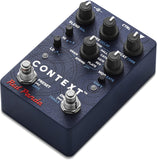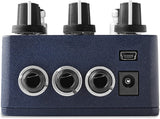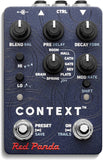Red Panda Context 2 Reverb
The Context is a reverb pedal inspired by 1980’s rack mount reverbs. It has 8 algorithms, including room, hall, cathedral, gated reverb, reverse reverb, plate, spring, and a granular reverb. Each algorithm features separate high and low frequency damping controls, pre-delay, modulation, dynamics (duck/expand), and infinite hold. In addition, delay is always available, along with tremolo in spring mode.
The modulation knob changes the amount and character of the internal reverb modulation, specific to each algorithm. It gives you a mix of different modulation types from 1980’s and early 90’s reverbs, including chorus modulation, random modulation that keeps the pitch stable, and deep modulated reverbs. Holding down the shift button adjusts the modulation rate.
Reverse reverb fades in louder and brighter over time, giving the impression of playing backwards. Modulation adds a wash of normal reverb.
The spring reverb was designed using the techniques and algorithms that were used in 1980’s reverbs, but with enough DSP power to drip and feel like a spring tank. You can adjust the length of the decay, high and low frequency damping. The modulation is tremolo with adjustable intensity and speed.
Grain mode is a granular reverb inspired by the Ursa Major SST-282 Space Station. The SST-282 was released in 1978 and used multiple delay taps with modulation to create reverb effects. The Context can create ghostly reverb effects, slowly sweeping resonances, and at higher modulation settings is a multi-voice granular processor that creates clouds of detuned sound fragments for entirely new reverb sounds.
When the shift button is held down, the top row of knobs adjust delay parameters. The low and high damping knobs adjust dynamics for ducking reverb or an expander for more reverb on louder notes, with adjustable threshold and recovery time. Holding down the foot switches gives you two different types of infinite sustain.
One preset available on the left footswitch, 4 using a remote footswitch, and 127 via MIDI. The expression pedal can be assigned to any combination of parameters.
The modulation knob changes the amount and character of the internal reverb modulation, specific to each algorithm. It gives you a mix of different modulation types from 1980’s and early 90’s reverbs, including chorus modulation, random modulation that keeps the pitch stable, and deep modulated reverbs. Holding down the shift button adjusts the modulation rate.
Reverse reverb fades in louder and brighter over time, giving the impression of playing backwards. Modulation adds a wash of normal reverb.
The spring reverb was designed using the techniques and algorithms that were used in 1980’s reverbs, but with enough DSP power to drip and feel like a spring tank. You can adjust the length of the decay, high and low frequency damping. The modulation is tremolo with adjustable intensity and speed.
Grain mode is a granular reverb inspired by the Ursa Major SST-282 Space Station. The SST-282 was released in 1978 and used multiple delay taps with modulation to create reverb effects. The Context can create ghostly reverb effects, slowly sweeping resonances, and at higher modulation settings is a multi-voice granular processor that creates clouds of detuned sound fragments for entirely new reverb sounds.
When the shift button is held down, the top row of knobs adjust delay parameters. The low and high damping knobs adjust dynamics for ducking reverb or an expander for more reverb on louder notes, with adjustable threshold and recovery time. Holding down the foot switches gives you two different types of infinite sustain.
One preset available on the left footswitch, 4 using a remote footswitch, and 127 via MIDI. The expression pedal can be assigned to any combination of parameters.






